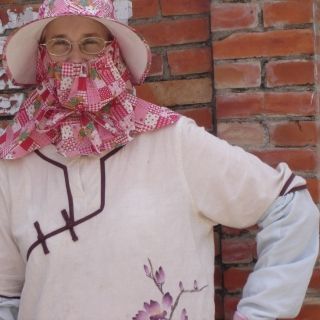
The joys of country living
Unlike us Americans who LIKE to get tan, the Taiwanese take measures to protect themselves from the sun. For instance, they do not think it strange to go for a walk on a sunny day with an umbrella over their heads. There are even umbrellas made to block the sun’s rays!
Recently Ruth became the grateful recipient of gifts from two neighbors — both intended to deliver her from being over-exposed to the sun as she traveled delivering the Grace meals to needy neighbors. One gift: homemade sleeves meant to be worn just when one is out and about and working in the sun. The other gift? A beautiful red bonnet! So now, Ruth is all set to GO! Ruth wears her gifts with heartfelt joy and gratitude.
It’s a beautiful feeling. When one enters into a community and learns to humbly receive and use the help that is offered, solid friendships result. Could this be why Jesus told his disciples to go out without purse or extra shoes and clothing? We are discovering that the people of Dalin love to return our kindness with acts and gifts of kindness, so we are learning to gracefully receive. Sometimes it is HARD, but we are learning to trust God to bless them abundantly and care for their need.
Life in the countryside appeals to us. The people are friendly and accessible. It's great to just sit and talk, getting to know our neighbors. After a little while, they open up and we can talk about their needs and the Lord's provision. What a privilege we have to be able to talk with the Taiwanese about real heart issues. This is the joy we have as church-planting missionaries serving with SEND International in Taiwan, pursuing the fulfillment of Vision 119.
Additional Posts




